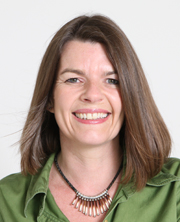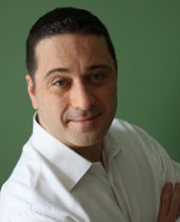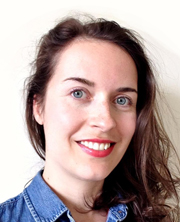3.4 Translators on language learning
In Section 2, you came across several translators giving an account of what their working day is like. We asked one of them, Charis Ainslie, a freelance translator (Italian and French into English) and editor, to tell us about her language background and her own language development. Here’s what she said:
My working languages are French and Italian into English. I learned French at school and did French and Italian at university followed by a Masters in Translation and Interpreting. I have lived and worked in France, and take every opportunity to spend time in Italy. I am particularly fascinated by Sicily. I also speak a little Arabic, having lived in Egypt for a year. I would love to add it to my working languages, but I’m not there yet!
We also asked freelance translator Keith Baddeley about his language history and how he keeps up with his languages. This is what he told us:
Keith, tell us about your language background and the languages you use professionally.
I studied French and German at O-level and A-level at school and then did two years of a degree course before having to give up for family reasons. I came back to languages 20 years later, initially studying Spanish ab initio with The Open University. That turned into six years studying for a BA (Hons) in Modern Language Studies (Spanish and French). I then did an MA in Specialised Translation at the University of Westminster in 2014/15. I speak Spanish and French at C1 and still a smattering of German, perhaps to B1. During my MA, I also learnt Romanian during a subsidiary language module, although mostly passively. In other words, I can hardly speak it at all, but can pronounce it, read it and translate from it. Today, I use Spanish, French and Romanian in my translation work.
So what do you do on an ongoing basis to keep up your competence in the languages you use professionally?
Living in Spain definitely helps with my Spanish! I make sure I watch the news in Spanish, popular TV programs, the radio, etc. – all these help with my speaking in particular. I also do this for French, but to a lesser extent – online video news around twice a week. I also read a lot in Spanish and French, but usually more popular texts (novels, magazines, etc.) rather than the type of texts I translate – which of course I’m reading too in my source languages, as I only translate into English, which definitely maintains my language competence. It’s easy to let your source language(s) / second language(s) slide – from a speaking and writing perspective – if you don’t produce them and only translate from them, so the key is to keep producing your non-native languages as much as possible. If you don’t live in your native-language country, make sure you don’t neglect your native language either; you need to keep that up too, in my case, through reading the British press, watching British TV, listening to British radio.
And what advice would you give students who are about to embark on an MA in Translation?
I would say three things: first of all, produce your second language on any occasion you can – speak it with friends; write it, even if it’s just for you. If you have agency clients in your second-language country, email them in that language, speak to them in that language – not in your native language. This is hard to get used to, but not only does it help you maintain your second language, it’s professional too. In my experience, even though I translate into English only and am seen as an English-language specialist, clients appreciate it so much when I communicate with them in their language. Sometimes, there’s no alternative: not all project managers in translation agencies in France, for example, speak English.
Secondly, if you are translating from your second language (and most people do professionally), go to trade shows etc. related to your specialist areas that are in your second-language country. Prepare and practise what you want to say before you leave for the show. While you’re there, speak to anyone and everyone about their products, their services – in your second language. This is so important because such trade shows are a great source of direct clients, and you need to win and maintain those direct clients preferably using your second language.
Finally, in the early days of being a translator, even though you have level C1 in your second language, you will find you look up words a lot more than you thought you would and that you can never imagine translating 2,000 to 3,000 words a day. This is normal. It’s all to do with experience and wanting to be sure you’ve chosen the right word, correct phrasing in the target language. Don’t get disheartened. It will get easier after a few busy months - you end up trusting yourself more, trusting your instincts and settle into your own way of writing for the type of texts you specialise on.
Finally, we interviewed language coach, blogger and freelance translator Agnieszka Murdoch. Agnieszka runs the website 5-Minute Language [Tip: hold Ctrl and click a link to open it in a new tab. (Hide tip)] . Her mission: to help and motivate language learners worldwide so that every person in the world has a chance to learn a foreign language! Here’s the extended interview with Agnieszka:
What languages do you translate to or from? What do you specialise in as a freelance translator?
I translate from Polish into English and English into Polish, as well as from French into English. I have experience of translating literary and journalistic texts.
So, Agnieszka, what is your language background?
I’m fluent in Polish, English and French (C2). I also have some knowledge of Spanish (A2) and German (A1), and I’m currently learning Japanese (I’m a beginner). Polish is my native language, and I learned English and French when I was still at school. I took up Spanish, German and Japanese when I was already working full-time as a digital content manager.
What do you do on an ongoing basis to keep up your competence in the languages you use professionally?
Maintaining fluency can be a challenge, especially with languages I don’t use frequently. Reading (newspapers, magazines and fiction) is my favourite way of keeping up my competence in my languages. I try to speak as much as possible as well, even if it’s just talking to myself!
I try to incorporate language learning into my daily routine and make the most of the time I have to get better (e.g. by reading the news in foreign languages only, or listening to podcasts on my way to work).
What advice would you give students who already have a level C1 in their second language and who are about to embark on an MA in Translation?
My main piece of advice would be to focus on idiomatic language and collocations. Good translation is about making language sound natural, which is difficult to do without the knowledge of how idiomatic expressions and collocations work. Reading extensively, both in your target language and your source language, is in my experience the best way to approach this challenge.
I also strongly recommend that students focus on expanding their vocabulary vertically. What I mean by that is not learning more words but learning additional ways of expressing the things they can already say. This includes learning synonyms and understanding the difference between them. Accurate translation requires knowing the difference between two words which may initially look very similar.
Finally, I would encourage students to reflect on what it is that they’re interested in, and what their strengths are. Translation is a very versatile field, with a number of specialisms. Understanding what excites and motivates you is a key element of your professional development that can help you shape your career and focus on the things that are right for you.
We also interviewed Marta Stelmaszak, a Polish/English translator based in the UK. You can find out more about Marta from her website: Want Words. When we interviewed her, Marta told us about the languages she uses professionally, how to keep up to date with her languages and the fields she specialises in. She also gave some advice for Translation students about how to keep up their language skills. Listen to the following two audio recordings to find out what she said:



